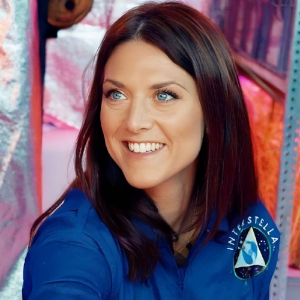Scientists are testing a new system to feed space travellers making long journeys – to Mars or further – or establishing colonies on the moon. Closed loop farming is a soil-free system that uses closely controlled fertilization and recirculated water.
Small start-up, big dreams
A technology start-up called Interstellar Lab is staking everything on NUCLEUS. And it is already imagining much wilder applications of its techniques than just getting humans to Mars or enabling permanent settlements.
CEO Barbara Belvisi (see photo, top of page) describes the company as ‘the pursuit of a child’s dream in the context of the climate crisis on Earth. At the youngest age, I dreamt of becoming a multi-planet species and to live under domes on other planets, surrounded by plants.”
“The initial focus was to build a regenerative food production system to advance sustainable farming on Earth. But I asked, ‘what if the technology we will need to live in space could help us live more sustainably on Earth?’ That’s how the concept of advanced controlled-environment modules for Earth and space was born,” Belvisi explains.
What’s on the menu?
One of the NUCLEUS concept’s most notable advantages its potential to grow a variety of different foods. It’s versatility is complemented by its 9-module design, intended to feed up to four astronauts on a two-year mission. NUCLEUS currently grows fresh microgreens, vegetables, mushrooms, and also edible insects. By the time it’s deployed on a mission in spaceit may suppoer even more species and varieties of foods.
That’s an important intangible benefit. Nobody wants to eat boring, repetitive meals. Remember my paternal grandma’s creedo: ‘Variety is the spice of life’. This also sounds like a good point to remind readers of the old adage: ‘Some folks eat to live; others live to eat!’
One important advantage
NUCLEUS is already being tested in cooperation with a variety of potential private companies, after a year’s review by engineers at NASA AMES Space Portal in 2017. Since its original release back in 2017, it’s been generating valuable feedback from development partners since before other competitors in the Deep Space Food Challenge were even conceived.
Evan Fraser, director of Arrell Food Institute at the University of Guelph, says: “The vertical farming industry [has] done a remarkable job of reducing labor, water, and [significant] costs such as land costs. They are achieving a huge amount of productivity per square acre, per hour of worker [time] and per liter of water use,” Fraser adds. Not only does Fraser believe vertical farming is a good approach to sustaining life on Mars, he goes as far as to say, “It’s the only option.”
What with the accelerating crash of Earth’s traditional agricultural systems, forecast to hit within a couple of decades due to climate change, the Earth-bound applications of techologies such as NUCLEUS may dwarf its space-bound role by many orders of magnitude – even before it literally gets off the ground…
~ Maggie J.

